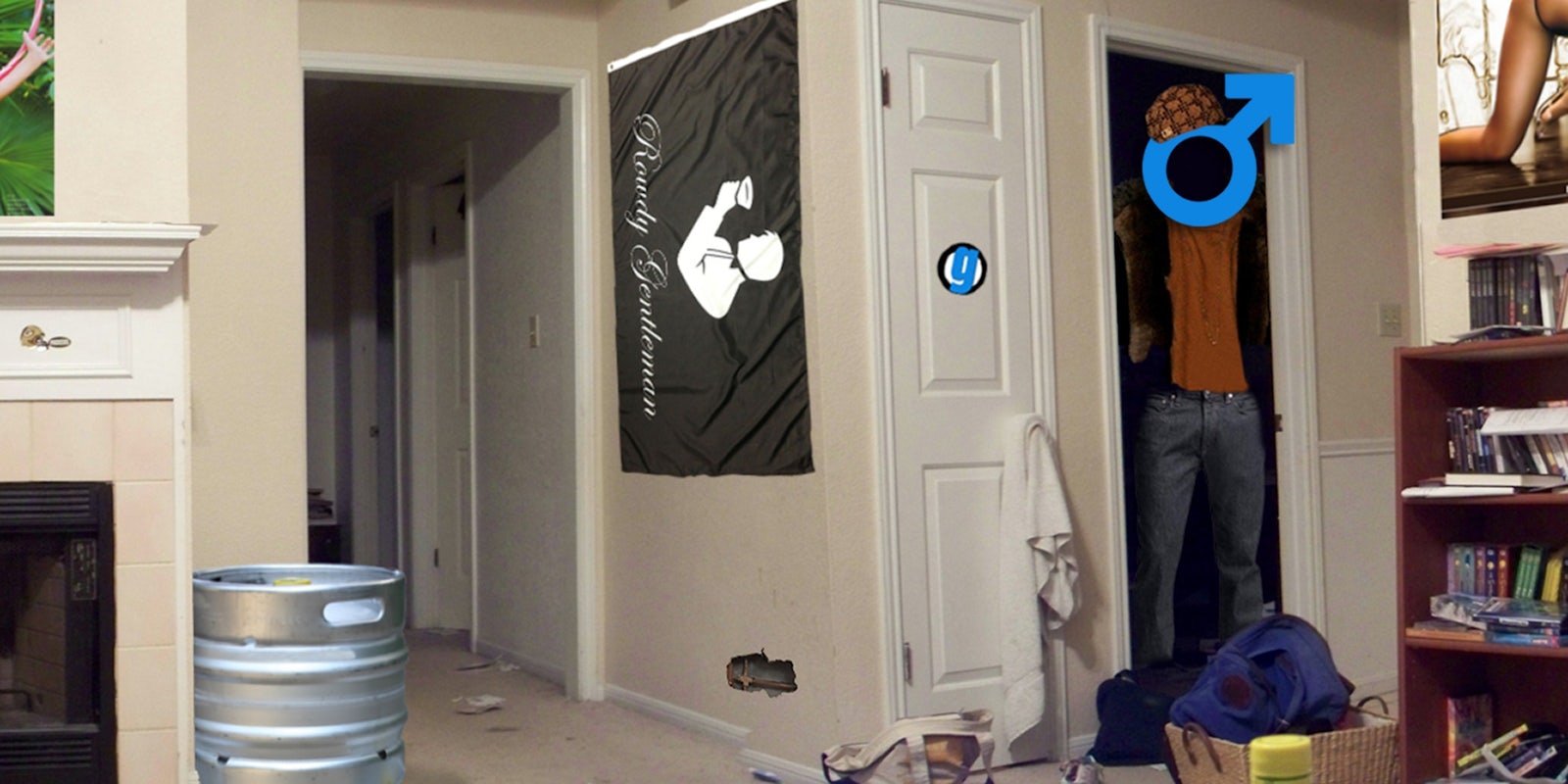Rob Fox was tailgating with Sig. Ep at Southern Methodist University in Dallas when he was stopped by a fan. The guy loved Fox’s raunchy humor pieces on Total Frat Move (TFM), a popular site for fraternity bros. Fox, 27, asked if he was a freshman. “No,” the fan said, “I’m 14.”
High school kids aren’t TFM’s target demo (that would be males 18 to 35), but young men are fascinated by the site’s depiction of college life—parties, women, drinking—and other “male interests” as seen online.
“When I was in high school, anything I knew about fraternities were rumors, and overblown myths and legends,” Fox told the Daily Dot. “Total Frat Move gives kids a window into this cool, fascinating world that they don’t know anything about. High school kids think college kids are the coolest people in the world, so it’s a hierarchy.
“I’m not arrogant enough to say fraternity guys are the coolest people around, but that’s definitely the image we sell.”
Total Frat Move is just one of many mancaves on the Internet. Men’s online media extends well beyond the blog offshoots of men’s magazines like Esquire and GQ and into separate entities creating content for men, by men.
Popular men’s sites range from the Greek life–worshipping Total Frat Move and the unapologetic exploits of Barstool Sports to side-boob celeb tracker Egotastic and lifestyle blog Guyism. Men’s sites are visual and honest. They love photos of women, real hookup stories—either sexy or disastrous—and tales of the woes of frat initiation. They want to know how to meet women, what to wear to get laid, and how to cook a steak on the outdoor grill in time for football season.
While plenty has been written celebrating the neverending crop of popular websites geared at women and their interests—Jezebel, the Hairpin, HelloGiggles, the Frisky, etc.—the places bros gather on the Web remain cloaked in general disapproval, charged with embracing misogyny and rape culture.
Yet they’ve become media empires in their own right. TFM, for example, has a sister site, Total Sorority Move. BroBible and Guyism have been bought out by larger media companies, their editorial staffs have expanded, and the ad dollars are rolling in. Now, some of the sites are starting to grow up, taking their readers from “young dude doing a keg stand” to “young man paying his mortgage and ordering fine wine.”
It’s bro media, once for a specific type of man and now, for better or worse, aimed at “the everyguy.”

Chill, “bro”
Bill Swift, an editor for the sexy female celeb site Egotastic, threatens to end the interview if I say the B-word one more time.
“You gotta promise not to use the word ‘bro’ again, really,” he scolded me from Egotastic’s L.A. offices. “I haven’t heard that term since 1998. I don’t know any guys who have used that term in 10 years. I certainly don’t use it.”
The editors of men’s sites are split on the word “bro,” though it’s the linchpin of the culture.
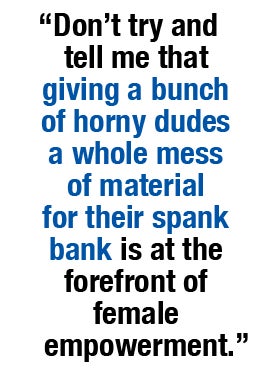 “I’m not wild about being classified as bro humor,” Fox, an Austin, Texas–based brother in Delta Sigma Phi, said of TFM, which has garnered 670,000 Twitter followers and a New York Times bestseller since launching three years ago. “When I picture a bro, it’s more Jersey Shore than it is fraternity.”
“I’m not wild about being classified as bro humor,” Fox, an Austin, Texas–based brother in Delta Sigma Phi, said of TFM, which has garnered 670,000 Twitter followers and a New York Times bestseller since launching three years ago. “When I picture a bro, it’s more Jersey Shore than it is fraternity.”
“It’s definitely one of those words that’s gotten used to death,” agreed MadeMan and Chickipedia Managing Editor Steve Mazzucchi, 35. “Like manscaping, mancave, mancation. Just putting “man” in front. There’s no cleverness to ‘bro.’ Guys who read us may consider themselves ‘former bros,’ because they’re a little older. ‘Bro’ has a younger feel.”
Manhattan-based BroBible actually began as a “brocial network,” but Editor Brandon Wenerd said the site’s direction has changed a lot since then, as the idea of the “bro” morphed into a more mainstream model.
“I realize people associate ‘bro’ with douchebag and I think that’s unfortunate. We try to do as much as we can on BroBible to combat that by celebrating what ‘bro’ is and also by putting on blast what ‘douchebag’ is, because there’s a difference between the two,” he said. His site often styles the word with a capital B, as in, “And Bros, YESSSS that is a miniature poster of Mel Gibson in The Patriot.”
“I enjoy spending time with my guy friends. I like sports, I like music, so yeah, I am a bro.”
The male gaze
“Bro” is an easy insult to toss their way. When “bro media” is picked up by feminist sites, the word is used against them. In a critical article about BroBible from 2008, Gawker accused the site of “eHighFiving about [Jäger] and pussy.”
“I think bro is a gauche word to use in some circles,” Chris Spagnuolo, founder of Guyism, said. “You don’t want to have that stigma attached to you, so we say ‘guy’ rather than ‘bro’ because there’s a rape culture–y thing tied to ‘bro’ that we don’t want to be associated with.”
“Rape culture” has become a common phrase recently, referring to anything “condoning, trivializing, and eroticizing rape,” according to Lynn Phillips, a lecturer with the University of Massachusetts–Amherst Department of Communication. The phrase originated in the 1970s and spoke of prevalent attitudes, linked to male dominance, that normalize rape and lead to the objectification of women, slut-shaming, and victim-blaming (the ol’ “she was asking for it” defense).
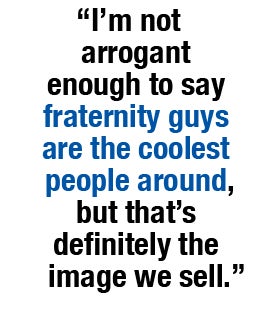 When many of the editors of these men’s sites defended their content, they spoke harshly about Gawker Media’s feminist outlet Jezebel: a common enemy. The sites feel like they’re portrayed unfairly, with content catered to an audience that’s eager to read negative stories about Greek life.
When many of the editors of these men’s sites defended their content, they spoke harshly about Gawker Media’s feminist outlet Jezebel: a common enemy. The sites feel like they’re portrayed unfairly, with content catered to an audience that’s eager to read negative stories about Greek life.
Jezebel’s coverage has certainly been extensive, exposing horrific hazing rituals like “butt beer,” being branded with a hot fork in the groin area, and ill-advised moves like Yale’s “rape chants.”
Jezebel journalist Katie J.M. Baker is on the Greek life beat, writing stories like “‘Pedo Parties’ and Racist Ragers: Why Are Frat Bros Fixated on F**ked-Up Theme Parties?,” “Bryn Mawr College Takes ‘Hazing’ Verrrry Seriously,” and “Washington University Frat Suspended After Pledge Scavenger Hunt Gets Racist.” The stories have an unmistakable pattern—racist and sexist theme parties, hazing, embracing rape culture—even though the risk of getting caught and receiving bad press or being kicked off campus for those involved remains high.
“History repeats itself—even more so nowadays thanks to social media—but so many frat bros and sorority sisters still think the rules don’t apply to them,” she wrote in an email. “That’s not ignorance; that’s privileged entitlement.”
But it’s not just Greek life that draws the ire of feminist outlets—it’s the objectivation of women through countless photo spreads.
Egotastic, an “adoration” celebrity gossip site, posts sexy photos and videos of famous attractive women with the tagline “Because Men Think Differently.” A typical post for the site, which garners 12 million unique views a month, is Hayden Panettiere in a bikini, January Jones topless in her latest movie, or Paris Hilton accidentally flashing her underwear in a short pink dress while vacationing in Hawaii.

Photo via Total Frat Move
“My female friend calls Egotastic a ‘third-wave feminist’ website,” Swift said, “meaning women have all the power over men. It’s really for men who adore women.”
Amelia McDonell-Parry, editor-in-chief of women’s site the Frisky, isn’t buying it. (Interestingly, the Frisky and Egotastic are both owned by Spin Media Group.)
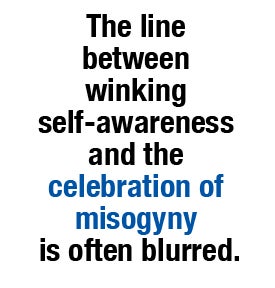 “The argument that these women have power over men because men come to the site to ‘idolize’ (i.e., jerk off to) their images is an example of how some men have glommed on to aspects of feminism—in this case women’s sexual power—that justify the perma boner in their pants,” she wrote in an email. “A lot of things contribute to rape culture, and yes, sites that exclusively objectify women as sexual objects play a part, whether the owners and readers realize it or not.
“The argument that these women have power over men because men come to the site to ‘idolize’ (i.e., jerk off to) their images is an example of how some men have glommed on to aspects of feminism—in this case women’s sexual power—that justify the perma boner in their pants,” she wrote in an email. “A lot of things contribute to rape culture, and yes, sites that exclusively objectify women as sexual objects play a part, whether the owners and readers realize it or not.
“Objectification is not all bad, but it’s not all good either. These things are insidious and subtle and complicated. But seriously, don’t try and tell me that giving a bunch of horny dudes a whole mess of material for their spank bank is somehow at the forefront of female empowerment.”
For Guyism, a four-year-old site with the motto “What Guys Need,” it’s all about the presentation.
“It’s been a part of the men’s magazine landscape for so long that people expect it,” founder Spagnuolo, 28, said of the photo dumps. “But it’s really about how you make it creative, and of course, not being creepy but being celebratory, presenting it in a way that’s fun and not debasing anyone for being professionally pretty but also reaching the audience you’re trying to reach.”
While sites like the Chive, a popular men’s humor site, post photos of “Chivettes” who send in their pics for admiration, they also curate posts like this photo dump “Let Your Imagination Run Wild: 76 Hot Girls on Horses,” which includes stock photos and photos used, presumably, without the models’ consent. As much reviled as it is beloved, Barstool Sports has notorious Smokeshows, with pictures of non-famous women curated mainly from Facebook, sometimes submitted by them, sometimes submitted as “tips” by others.
Those sexualized image dumps of non-celebrity women are “innately distasteful to a normal, reasonable person,” said BuzzFeed Senior Editor Katie Notopoulos. It’s the potential lack of consent, she told us, that separates such displays from traditional magazine spreads. But she agreed that sexy photos in men’s magazines aren’t new or exclusive to the Internet.
“I think what gets weird is the Internet has given men available images of women who aren’t professional models/actresses and aren’t necessarily trying to get this form of attention.”
Relax, it’s just humor
What kind of responsibility do male-driven sites have not to perpetuate rape culture?
Fox said that Total Frat Move struggles with having an ironic, sarcastic voice that may not be picked up by people who take its content literally, like the high schooler who stopped him in Dallas. What’s done with a wink by them could be gospel to a reader.
“The less you understand about [Greek life], the more seriously you’ll take it,” Fox said. “The people who understand it’s mostly parody or sarcastic are the people in fraternities and sororities. It’s a lot of subtle language you pick up from living in a house.”
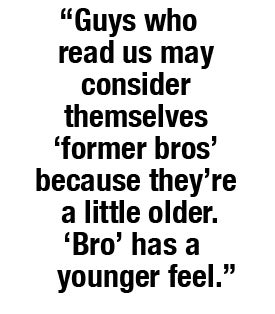 The site has received criticism from women regarding content like photos of half-naked young women and a popular column called RushBoobs. Fox said he understands it might make women uncomfortable, but all photos on TFM are submitted with the subject’s approval. If TFM gets an email from a woman asking them to remove her photo, the site always will. And in the end, Fox said, he can’t be held responsible for the ignorance of others.
The site has received criticism from women regarding content like photos of half-naked young women and a popular column called RushBoobs. Fox said he understands it might make women uncomfortable, but all photos on TFM are submitted with the subject’s approval. If TFM gets an email from a woman asking them to remove her photo, the site always will. And in the end, Fox said, he can’t be held responsible for the ignorance of others.
“If I write about hazing, my goal is not to get people to go out and haze. If that’s what someone takes away from that, that’s their fault for being stupid,” Fox said. “If someone goes out and binge-drinks because of our website, I can’t be held responsible for other people’s stupid decisions. It’d be no different than blaming The Hangover for getting people to drink a lot.”
There’s a mixed bag of responsibility that comes with the more racy or sexist content on bro sites. An article on BroBible titled “9 Ways to Get Her to Leave After Sex” is clearly meant to be a joke, but at face value, by someone young or impressionable, it could be taken as an example of how to treat women. When the audience might not be on the same level as the contributors, the line between innocuous self-awareness and the celebration of misogyny becomes blurred.
“We’re not necessarily setting out to satirize it, but we acknowledge that it’s a likely situation for a bro to end up in,” Wenerd said of the piece. “This is why we work in jokes about Sperry boat shoes and wild nights that end drinking Natty pounders at Brother Jimmys; we know our audience can identify with these situations, even if it makes them cringe a little, or a lot, internally.
“It’s social currency between a male archetype.”
Guyism struggles with a similar dichotomy to TFM, especially, Spagnuolo said, when it comes to the site’s video content.
“We could put out content that’s smart, dry, and interesting, but if it has our video producer, Katie Nolan, they’ll just comment on her breasts or ask when she’s going to be naked,” he said, sounding disappointed. “She’s not going to be naked. She’s here because she’s funny, so it’s a little frustrating.

Guyism’s Katie Nolan
“You hope the audience will become more educated to know when we’re being silly or joking, but if not, you can just enrage people and they’ll still click. It’s really just part of the economics of the Internet.”
Jezebel, EqualityNow, StopStreetHarassment, and other feminist sites have critiqued Guyism’s video content, specifically a clip of site producer Ryan Jones handing out prizes like maracas, giant lollipops, and flowers to women in NYC showing skin on spring’s first warm day.
TheGloss called the video “street harassment” and said it showed a lack of understanding about the creepiness of the unsolicited male gaze. “My body is not public space,” wrote StopStreetHarassment.org about Guyism’s video. “In case he didn’t get the memo, just because women are in public space does not mean they ARE public space and that it’s OK to comment on them.”
Spagnuolo seems to take the whole debacle with the eye of a web CEO; he’s happy to be noticed at all and, more importantly, linked back to.
“A lot of sites traffic in indignation. Good intentions can be turned in a certain way and that’s [women’s media’s] job,” he said. “We’re very aware of what we’re putting out there, so hopefully people get what you’re doing, but if you take one thing out of context it won’t look favorable.
“I don’t think we’re bad citizens.”
Growing pains
Over the past five years, Wenerd said he’s tried to phase out posts that are just photos of women and focus BroBible on original content with opinions, a solid voice, and great subject matter. It’s not an easy task. After all, no one actually goes to Hooters for the wings.
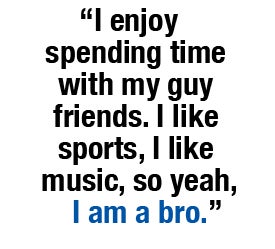 But where BroBible once focused only on girls and sports, it’s now driven by relationship material, self-improvement posts, and content about easing post-grad woes. The site’s most popular column, 9th Semester, follows an average 23-year-old guy trying to get a leg up in the real world.
But where BroBible once focused only on girls and sports, it’s now driven by relationship material, self-improvement posts, and content about easing post-grad woes. The site’s most popular column, 9th Semester, follows an average 23-year-old guy trying to get a leg up in the real world.
“We don’t think of ourselves as a frat house,” the 27-year-old Wenerd said. “We post mainstream content, but we present it in a more digestible guy-to-guy way of consuming media. It’s just a common bond between guys.
“I think that’s largely what’s changed and I think our content model has evolved and changed with that on a bro-to-bro basis. Now, we concentrate not just on great content for bros but great content in general.”
Subsequently, BroBible has a less antagonistic relationship with feminist sites. Wenerd said he works with Betches Love This and often contributes tips to Jezebel. One recent example was the viral University of Maryland expletive-laden sorority email, which was a huge post for both BroBible and Jezebel, but for different reasons.
Wenerd is determined to take BroBible’s content into a more serious realm, though the site’s name and brand prove to be obstacles. Where Total Frat Move’s demographic skews Southern, BroBible grabs more of the Northeast lacrosse bro type, which proved useful on the Friday after the Boston Marathon bombings; BroBible broke the story of the remaining at-large suspect’s Twitter account. The scoop made sense: Dzhokhar Tsarnaev was a Northeast college student. (Likewise, Guyism broke the infamous Charles Ramsey viral video.)

Photo via Total Frat Move
“There was cultural currency that led us to discover the account because we’re ingrained in that world as writers, but mainstream media was chippy about BroBible being the first to discover it and about giving credit,” Wenerd said. “It signaled a major, major change in our content.”
BroBible’s not the only one trying to grow up. Busted Coverage Editor Joe Kinsey, 36, whose site covers sports gossip and sexy women, said that often men’s sites target “the bro who is starting to fade out of the bro community.”
“I think that the ‘bro’ world is still wrapped up in the post-college, ‘where is the next party?’ world,” he wrote in an email. His audience, however, consists of “craft-beer drinkers who appreciate a beautiful woman and probably haven’t played much beer pong over the last few months.”
Chickipedia, part of Break Media’s men’s lifestyle blog MadeMan, is exactly what it sounds like: a Wikipedia-style catalog of hot women. It may seem immature, but Mazzucchi, who used to work for Maxim, said his sites are aimed at an older audience than TFM’s or BroBible’s. The MadeMan reader enjoys the occasional picture post, but more so, he wants to know how to dress and date better. He’s not looking back at college; he’s looking forward to cooking meals and wearing a suit.
“Our readers are kicking it up a notch, and part of that is respecting women,” Mazzucchi said. “Certainly admiring them and admiring photos but not being demeaning or objectifying about it.
“It’s bringing guys along on their journey from bro to man.”
Main photo via abbamouse/Flickr | Illustration and GIF by Jason Reed

